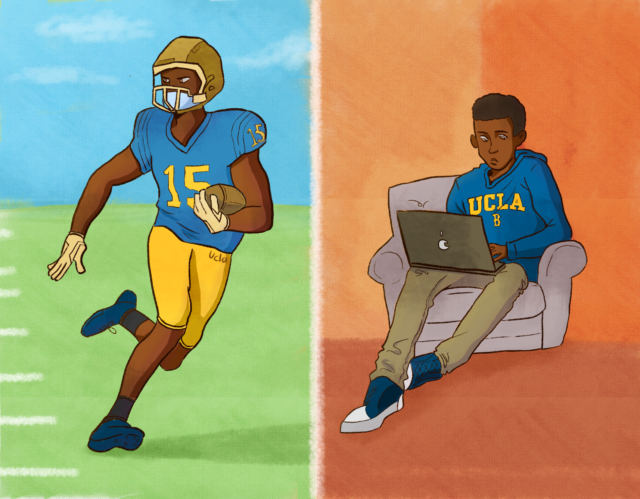I don’t want to write this article.
I really don’t.
But the time has come, and UCLA has dropped the hammer by agreeing with the Pac-12’s decision to postpone all sport competitions until Jan. 1.
One would think being in the middle of a pandemic would lead to only one solution – postpone everything until it’s safe. While the Big Ten and Pac-12 have made the call to push back fall sports until the spring, the ACC, SEC and Big 12 all plan to continue to play on time.
I’m no medical expert or administrator. I don’t want to sit here and tell you which plan is right or wrong because every person has to make that decision for themselves.
All I can do is lay out the consequences for UCLA because of the current reality that the university has accepted.
I’m here to present the pros and cons of the UCLA administration now that we know which path it has decided to take.
Pros – Less responsibility, more time
This one cuts both ways.
Student-athletes should theoretically be following state guidelines on social distancing, wearing masks and practicing other methods to avoid getting sick. However, without a season, they will not feel the weight of keeping their teammates healthy as well.
The biggest burden, though, is removed from the shoulders of the schools, for now.
No longer do they have to conduct frequent testing on hundreds of student-athletes, coaches and staff while not knowing whether a season will happen or not. No longer do they have to spend money on third-party testing agencies. No longer do they have to keep each and every person in check and make sure they’re following social distancing rules.
UCLA will be able to turn its attention to its ever-increasing online schooling, making sure athletes’ demands are met in terms of social justice movements and keeping the campus functioning at bare minimum capacity.
Instead of having to deal with a midseason PR and medical crisis if an outbreak happened within one of its teams, UCLA avoids the possibility entirely by canceling sports during the fall season.
There is still a path to bring them back in spring the right way.
What the Pac-12 has bought itself with its choice is time, which right now is one of the most valuable resources to have. Being uncertain has led to hesitation in making these calls so far.
A few extra months to work out scenarios is exactly what the conference needed. Many administrators delayed making plans, feeling that this pandemic would be over by now. Now, schools can choose how to approach the restart with a longer time frame.
By the time athletics come back in January, decisions should be made over disease testing, social justice issues, schedules and every other possible issue.
Con – Lost revenue, scholarships
Besides the personal feeling of getting to enjoy another season of college sports, the reason most schools are even considering coming back is because of the green.
Money.
Not every program is a cash cow. UCLA had a nearly $19 million deficit in its athletics budget for the 2019 fiscal year, which was only exacerbated by the pandemic. Teams other than football and men’s basketball usually cost the department more money than they earn.
[Related link: Student workers in athletics face challenges while sporting events are halted]
Obviously one of the big cons facing the department is the lack of revenue in the short term. That has been discussed, and conferences are looking at ways to compensate schools accordingly, such as the Pac-12 considering loaning money to schools hit hardest.
The bigger, forgotten issue is scholarships.
First, UCLA has already said it will honor financial aid for fall sport athletes who opt out of the upcoming season, yet the school is now forced to choose whether to honor all fall athletes’ scholarships since the whole fall season is canceled.
If the pandemic carries over into the winter and spring seasons, the situation would worsen. Spring athletes already had much of their season canceled last year, and UCLA would have to decide whether to honor scholarships for athletes who hadn’t played for almost two full seasons.
Second, the eligibility issues that come with a postponed season could have dire consequences. UCLA has to be ready and able to offer a fifth or sixth year of scholarship money to all student-athletes who have been granted an extra year of eligibility or risk fighting its own players.
Finally, UCLA must accept the impact this could have on future classes of recruits. Incoming freshmen will have fewer scholarship options if fifth- and sixth-year players extend their stays at UCLA. Teams like football and baseball with large rosters could not afford to miss out on one or two classes of recruits as they try to hold on to older players.
—–
The Pac-12’s solution has upsides and quite a few downsides. UCLA picked a side. Now it’s up to the school to stick to it and try to weather the storm as best as possible.

